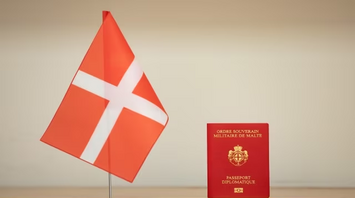Maltese Order Passport: unveiling a rare privilege and the magic of travel

Among hundreds of countries around the world, the passport of the Sovereign Military Order of Malta is considered the rarest. It is so exclusive that only a few hundred people around the world can obtain it.
Reportedly, it is intended only for members of the Sovereign Council and heads of foreign missions, as well as their families. Its owners are members of the Sovereign Military Order of Malta, one of the oldest institutions of Christian civilization, whose sovereignty was confirmed by Pope Paschal in 1113, as reported by Firstpost.
It is noteworthy that the Sovereign Order of Malta currently operates in 120 countries, providing medical, social, and humanitarian services, and it has its own constitution in addition to observer status at the UN. The Order employs 25,000 health care workers, 80,000 volunteers, and approximately 13,500 knights, ladies, and chaplains.
The very first passports were issued by the Order of Malta in the 1300s, when its ambassadors traveled to other countries with official credentials attesting to their position. Today, the crimson passport of the Order bears a coat of arms and gold text that reads "Ordre Souverain Militaire de Malta". These 44-page passports have a watermark in the form of a Maltese cross, but no other decorations.
Currently, there are only about 500 diplomatic passports of the Order in use worldwide, making them the rarest type of passport. The Grand Master, Deputy Grand Master, and Chancellor of the Order are among the select few who possess this valuable passport.
Grand Masters have the longest passport validity, ten years, as they are elected for two terms and must retire at the age of 85. Other passports are used only for diplomatic missions and have a four-year validity.
Two-thirds of Schengen members recognize the diplomatic passport, and the Order maintains close ties with a number of countries even in the absence of formal diplomatic ties, such as France, the United Kingdom, and the United States.
Members of the Order provide medical and humanitarian assistance to victims of conflict and natural disasters. They also run hospitals, emergency rooms, medical centers, homes for the elderly and disabled, canteens, and first aid stations.
However, it is important to note that the Order's passport is not recognized in several countries. Some countries do not recognize it as a legal form of identification for travel, including the United States, the United Kingdom, and New Zealand.
On the other hand, a number of other countries do recognize the passport of the Order. Among them are Slovakia, the Czech Republic, Germany, Austria, Malta, Spain, Italy, Latvia, Hungary, Poland, Portugal, and Slovenia.



















